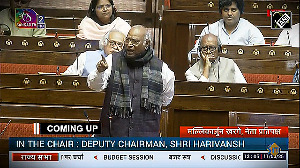Biyani, best known as India's Sam Walton, the founder of Walmart, was also dismissive of the culture of innovation in the country.
 Chief executive of Future Group Kishore Biyani is never short of words, especially when the debate revolves around online versus offline retail.
Chief executive of Future Group Kishore Biyani is never short of words, especially when the debate revolves around online versus offline retail.
On day two of the India Retail Forum, currently on in the city, on how new retail platforms were disrupting offline businesses, 53-year-old Biyani maintained what e-commerce was really doing - creating non-scalable ventures.
Former TV18 managing director Raghav Bahl and retail guru B S Nagesh discussed about 'India of Tomorrow' and what it offered entrepreneurs.
"E-commerce is creating businesses of less than Rs 1 crore or Rs 100 million.
Too often I find entrepreneurs coming up with ideas that can barely give them business beyond a time.
What is the point of having a venture like this if you cannot build value or scale?" Biyani asked a packed audience.
Interestingly, even as Biyani remained skeptical in general of the online boom and how long it would last, Bharat Banka, founder and ex-chief executive, Aditya Birla PE, said: "E-commerce has helped create a business, which is not necessarily profitable, but does have value."
Bahl, who has made the shift from TV to digital, said that for entrepreneurship to grow in India, the regulatory environment would have to be more conducive to it.
"The regulatory environment is challenging and what the regulators bring is a ministerial mindset to regulation, which I believe is incorrect. The creation of infrastructure, providing investment, aiding manufacturing and creating jobs, which help in building a viable entrepreneurship culture in India," Bahl said.
Biyani, best known as India's Sam Walton, the founder of Walmart, was also dismissive of the culture of innovation in the country.
"What we actually reward in India is not real innovation, but process innovation. There is so much more to innovation than just process innovation, but we barely go beyond that," he said.
His handy advice to entrepreneurs: Start a business with a big vision and the rest will follow.
"If you have a vision, a large one at that, you will find people who will help you achieve it," he told a young entrepreneur, who asked him how to handle venture capitalists and their growing demands of his business. There was another piece of advice from him: Don't hesitate to sell your business.
Biyani has lived this philosophy. In the decade since Biyani revolutionised retailing in India, he has attempted a number of things, eventually exiting a few of them.
A case in point is his insurance and financial services venture, Future Capital, which Biyani exited a few years ago.
He also sold his cash cow, Pantaloons, to the Aditya Birla Group and restructured his business to bring down debt. From Rs 8,000 crore three years ago, Future Group's debt has come down to Rs 5,870 crore now.
Biyani is now in the midst of another transformation - of making his Rs 18,000-crore or Rs 180 billion retail enterprise into a consumer goods giant.
He intends to pull off this ambitious plan by mapping consumer trends with the help of data science and analytics, launching affordable, but value-added, products at an aggressive pace across food and non-food categories and by expanding reach using a combination of online and offline methods.
The aim is to emerge as a multi-channel retailer.
In fact, Biyani's omni-channel retail initiative will kick off shortly (the beta version has been launched and dry runs are on), enabling him to offer convenience to shoppers.
The group will also launch its mobile wallet in the next two to three months as the trend gains ground.
"There are so many payment wallets already, I don't know how many will last," he said, indicating that the current fad for online businesses will not last.
'Will launch wallet'
Future Group founder and chief executive Kishore Biyani on Wednesday said the group will launch its mobile wallet in the next two to three months. "There are so many payment wallets already, I don't know how many will last."
Photograph, courtesy: Kishore Biyani/Facebook










 © 2025
© 2025